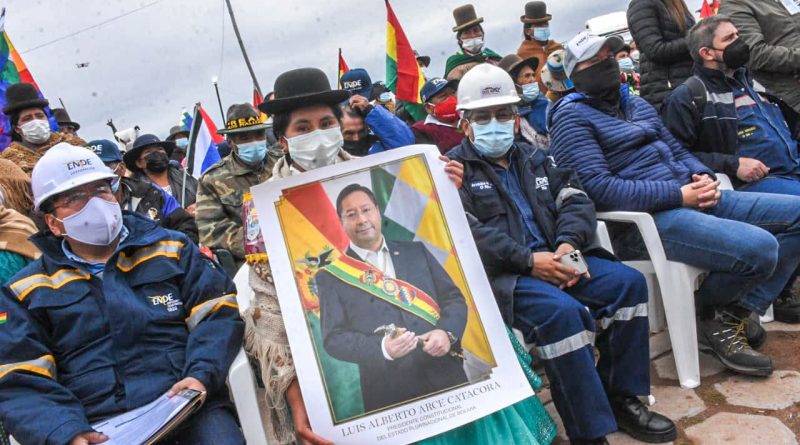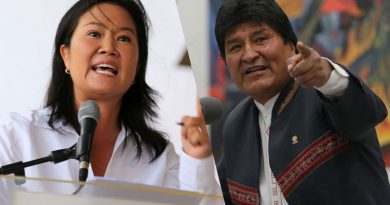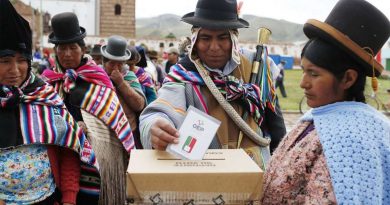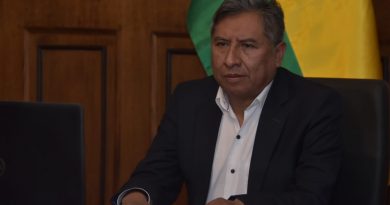Debunking Free Market Myths: Interview
We spoke to Bolivian economist Mike Gemio about how the country’s successful economic model debunks neoliberal myths about the supposed efficiency of free markets.
You recently wrote a piece in La Razón about the neoliberal myths that the Bolivian opposition still clings to blindly. What are some of those myths?
The neoliberal era saw the rise of certain ideas that have had a hold on public discourse for far too low. Principally, the idea that the state cannot efficiently manage resources and the idea that taxes should be cut for the rich because that money could go into investments and the wealth created will trickle down into wider society. These ideas were adopted in Bolivia up until 2006, and up until then, Bolivia had 64% of its population living below the poverty line, and we were in last place within the region for growth. This situation was reversed during the government of Evo Morales, but those neoliberal ideas never went away, the opposition is constantly reheating them despite their obvious failure.
A key proposal of theirs is that wealthy businessmen are the best people to manage public finances, since they have had success in their field. In reality, it was a campesino, Evo Morales, that turned Bolivia into South America’s fastest growing economy, lifting Bolivia out of the long economic disaster presided over by the same elites that still put themselves forward as candidates today. Evo Morales and Luis Arce have achieved this through a focus on state investment and redistribution of wealth.
The neoliberal era taught us that the wealthy are not the best managers of public finances, in fact, they are only capable of looting public finances. We can see that play out today in Santa Cruz where the opposition-controlled Mayor’s Office is embroiled in a corruption scandal in which ‘ghost jobs’ were created in the public sector, but no one was working them, the salaries flowed into the pockets of the local authorities and some of that money even financed the 2019 coup. The opposition has no vision for how the state can be an apparatus at the service of the public, they only see it as a vehicle to enrich a few and impoverish the rest.
Perhaps the most important myth of neoliberalism, both in Bolivia and the wider region, is the idea that one must always look to the United States, in the cultural sphere but also in economics, that all countries must copy the free-market model.
The US is not a free-market economy, they are too smart for that. They tell others to have a free market so that they can buy US goods, but those rules don’t apply the other way around. The US is certainly a huge economic power, but I would say that they have already been overtaken now by China. Neither the US nor China fit into neat ideological boxes, but China’s strength is its focus on poverty alleviation and redistribution, the result is that they have pulled more people out of poverty, in the shortest time, compared to anywhere else in the world. No one can deny that success. They have implemented this system of social solidarity while also inserting themselves into the global economy and working with others who have comparative advantages.
Bolivia has a lot to learn from this. China has strong national industry backed the state, as a result, their products are competitive. We also have to insert ourselves into the international economy, but without being swallowed up by it. That’s why our policy of Import-Substitution is so important, we can’t allow free trade to block the emergence of our national industry because then we’ll never be able to carry out serious poverty alleviation. The US vision of free trade that they impose on Latin America is about exploiting resources and limiting development in the region, but now our countries are putting the brakes on that relationship with the rise of progressive governments.
Latin America has to navigate this new international situation in which there are two poles of power, the US and China. We should remember that our entire history with the United States is of them exploiting our region. We live in a globalized world, but that doesn’t mean that we should not stand up for ourselves in the face of this abuse. Meanwhile, look at the history of China’s development. They are overtaking the United States, and they have done so without subjugating and looting another region in the way the US and has done with Latin America.
A challenge for the region is inflation. Bolivia has performed the best in this regard, we have the lowest inflation in the Americas, however, the opposition is calling for deregulation of the current import and export controls we have. Could that neoliberal demand endanger our success with regard to inflation?
First of all, we should remember that one of the most basic tasks of a government is to ensure there’s enough food for the national population and that the growth in internal demand can be met. A potential threat for a growing economy like Bolivia is supply not meeting the growth in demand as people rise out of poverty. When supply doesn’t meet demand, then you get inflation, and it can get out of control. Bolivia produces most of what it consumes, but there are certain key products, Soya, Sugar, vegetable oil, that are in the hands of large landowners rather than campesinos. The difference between the two is that large landowners can produce in larger quantities and therefore export their products more easily. Their aim is to take advantage of low production costs in Bolivia, to generate big profits by selling abroad for a higher price than what they would get selling within the country. If there were no export controls imposed by the state, then these producers would sell everything abroad and Bolivia would be left with shortages and therefore inflation. It would do tremendous harm to society and the national economy.
In around 2008-2009, Evo Morales ordered these types of food exports to be blocked until internal demand within the country could be met at accessible prices for consumers. This is part of what I mean about how public policy and finances cannot be managed by the wealthiest elites. Economic policy has to be focused on the interests of the poorest, because if the incomes of the poorest rise, then the wider economy will grow.
By Kawsachun News



